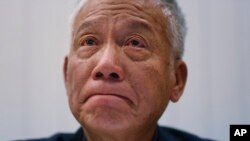The three founders of Hong Kong's Occupy movement are moving ahead with plans to surrender to police and are urging their fellow protesters to retreat for their own safety.
At a news conference Tuesday, Benny Tai, Chan Kin-man, and Chu Yiu-ming announced they will turn themselves into the Central Police Station at 3:00 p.m. local time Wednesday.
Benny Tai said it is unclear whether police will detain or release him and his Occupy co-founders, but he said they are ready to accept the consequences no matter the outcome.
He also urged the hundreds of protesters who remain camped on Hong Kong's streets to pull back and prepare for a long-term fight aimed at securing democratic reforms.
"The government that uses police batons to maintain its authority is a government that is beyond reason. For the sake of the Occupy safety, for the sake of our original intention of love and peace, as we prepare to surrender, we three urge the students to retreat, to put down deep roots in the community and transform the movement," he said.
On its Twitter page, the Occupy movement said the surrender "is not an act of cowardice" or admission of failure, but a denunciation of what it called a "heartless government."
Protester demands
The protests, which began in late September, are calling for authorities to hold fully democratic elections in the semiautonomous Chinese territory in 2017.
Authorities have declared the protests to be illegal and have tried several times to clear parts of the camps, resulting in violent clashes.
It is unclear whether the protesters will agree to back down. Several student leaders have said they will not surrender, insisting instead on further escalation.
One student leader hopes a hunger strike will convince authorities to consider reforms. Joshua Wong began his indefinite hunger strike late Monday, along with two other members of his group, known as Scholarism.
Twelve hours into the fast, the 18-year-old Wong told reporters his demand is to hold fresh talks, with no preconditions, on restarting Hong Kong's political reform process.
He also said he wants his action to help bring attention to the so-called Occupy Central movement, which has lost momentum in recent weeks.
"We admit that it's difficult in the future to have an escalated action, so besides suffering from batons and tear gas, we would like to use our body to get public attention on the issue. We are not sure if the hunger strike can put pressure on the government, but we hope that when the public finds out about the student hunger strike, they will ask themselves what they can do next," said Wong.
Hunger strike
The hunger strike is being held in the Admiralty district, where clashes erupted Sunday after protesters broke through police lines in an attempt to surround government headquarters.
Police pushed back with pepper spray and batons, but the protesters eventually succeeded in temporarily forcing government offices and parliament to close. Several protesters were injured and at least 18 were arrested.
Hong Kong's High Court has approved an injunction to clear part of the Admiralty site, though it is unclear if and when authorities will enforce that ruling.








